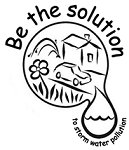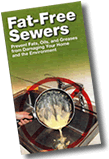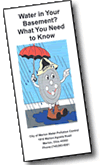City of Marion Water Pollution Control Department
The mission of the Water Pollution Control division is to protect the health of the community, as well as provide environmental responsibility by effectively and efficiently treating domestic and industrial wastewater.
 The Water Pollution Control Plant is responsible for the treatment of all domestic and industrial wastewater that passes through the City of Marion’s plant, as well as the disposal of the sewage sludge that is produced during the wastewater treatment process. Successful treatment and disposal is accomplished by adhering to all rules and regulations set forth by the Environment Protection Agency. To ensure proper operation of plant equipment and outlying stations, Plant Operators and Maintenance Personnel maintain the wastewater plant and 7 pump stations 24 hours per day, 365 days per year. Our staff is highly trained and their professionalism is reflected by the fact that 350 miles of sewers and over 4,400 catch basins are also maintained.
The Water Pollution Control Plant is responsible for the treatment of all domestic and industrial wastewater that passes through the City of Marion’s plant, as well as the disposal of the sewage sludge that is produced during the wastewater treatment process. Successful treatment and disposal is accomplished by adhering to all rules and regulations set forth by the Environment Protection Agency. To ensure proper operation of plant equipment and outlying stations, Plant Operators and Maintenance Personnel maintain the wastewater plant and 7 pump stations 24 hours per day, 365 days per year. Our staff is highly trained and their professionalism is reflected by the fact that 350 miles of sewers and over 4,400 catch basins are also maintained.
The City is better prepared to serve the needs of those utilizing our wastewater services after the most recent upgrade in 2003 at a cost of $23 million with a design capacity of 10.5 million gallons per day.
Marion NPDES (National Pollutant Discharge Elimination System) Permit
Combined Sewer Long Term Control Plan (CSOLTCP)
The City of Marion in conjunction with the Ohio Environmental Protection Agency has been working on revising the City of Marion’s CSOLTCP. Information pertaining to Phase 1 of the CSOLCTP can be found here.
Industrial User Local Limits Information
Information regarding industrial pretreatment local limits for the City of Marion Water Pollution Control facility can be found here.

 Fat-Free Sewers: What homeowners need to know about preventing fats, oils, and greases from damaging your home and the environment.
Fat-Free Sewers: What homeowners need to know about preventing fats, oils, and greases from damaging your home and the environment.

 Fat-Free Sewers: What Restaurant and Building Owners Need to Know About Grease Traps or Interceptors
Fat-Free Sewers: What Restaurant and Building Owners Need to Know About Grease Traps or Interceptors

 Water in your basement? Learn what to do for both short-term and long-term prevention, clean up, and more.
Water in your basement? Learn what to do for both short-term and long-term prevention, clean up, and more.




